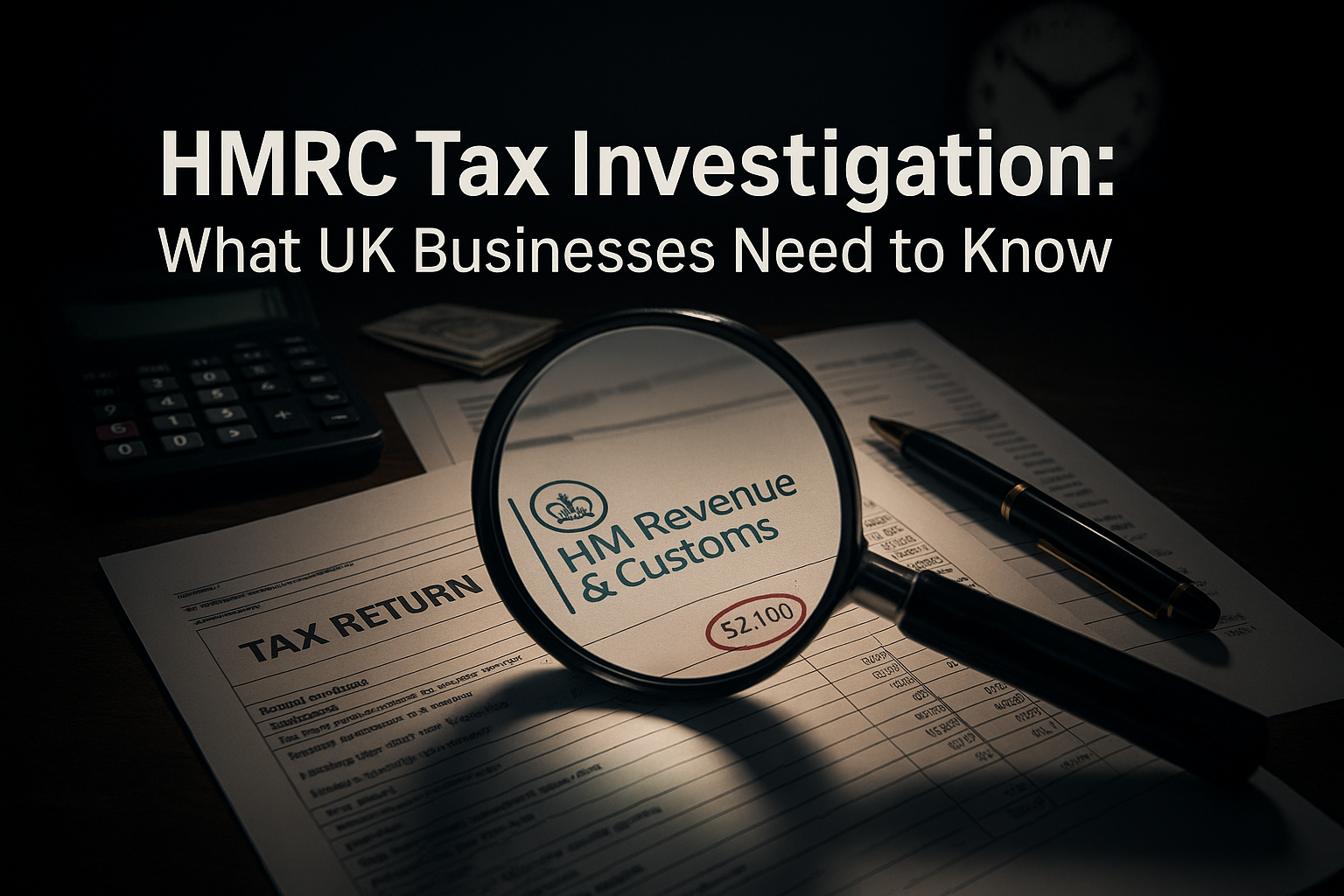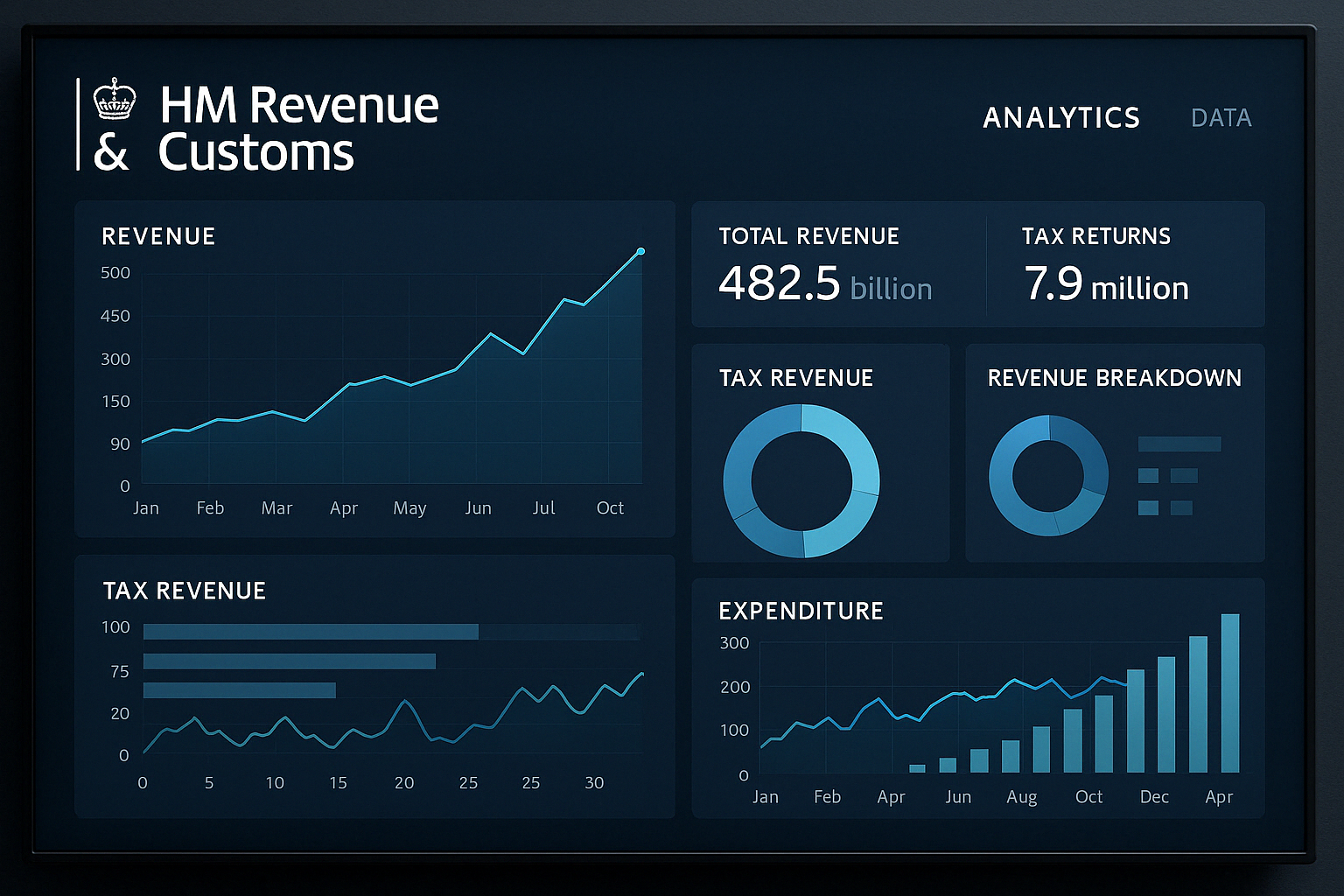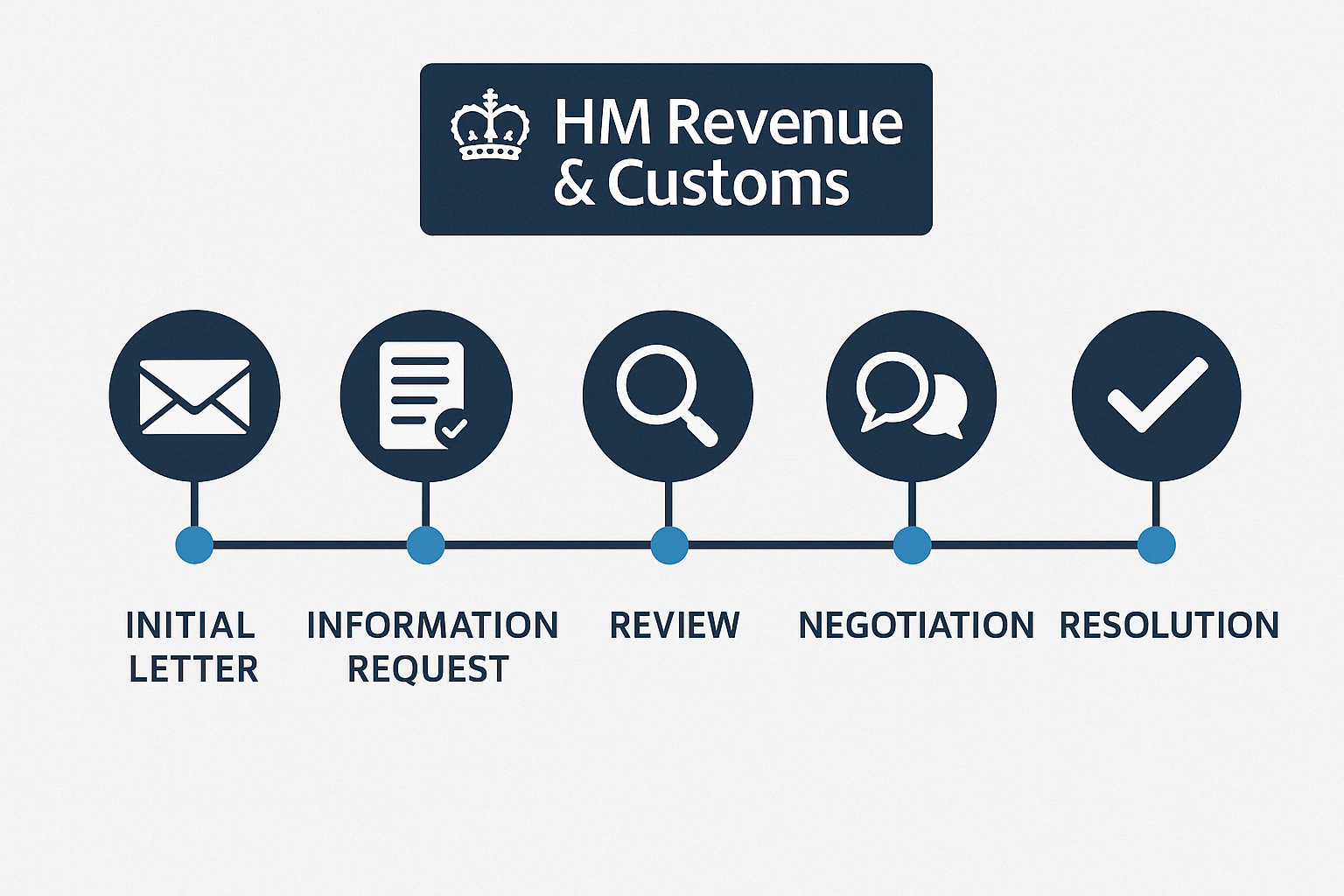
Getting that letter from HMRC about a tax investigation can make your stomach drop. I’ve seen business owners panic at the mere mention of it. But knowledge is power – and that’s exactly what this guide aims to give you.
Introduction
The phrase “HMRC tax investigation” strikes fear into the hearts of even the most diligent UK business owners. And honestly, I get it. The thought of tax officials combing through your financial records feels invasive and stressful. Perhaps you’re wondering if you’ve made an innocent mistake that could end up costing you dearly. But here’s the thing – while HMRC tax investigations can be daunting, they’re also a routine part of the UK tax system that helps maintain its integrity. With proper understanding and preparation, you can navigate this process with confidence rather than fear. In this comprehensive guide, I’ll walk you through everything you need to know about HMRC tax investigations – from what triggers them and how they unfold, to practical steps for responding effectively if you find yourself under scrutiny.

What Exactly Is an HMRC Tax Investigation?
An HMRC tax investigation is essentially a review conducted by Her Majesty’s Revenue & Customs (HMRC) to verify whether you’ve paid the correct amount of tax. Think of it as a financial health check-up – sometimes routine, sometimes prompted by specific concerns. These investigations relate directly to your Accounts and Tax filings. These investigations can range from simple clarifications about specific items on your tax return to comprehensive examinations of your entire tax history. The scope largely depends on what triggered the investigation in the first place. I’ve found that many business owners mistake all HMRC communications for full-blown investigations. It’s important to understand that a simple query about your tax return doesn’t necessarily mean you’re under investigation. However, all communications from HMRC deserve prompt attention and careful response.
What Triggers an HMRC Tax Investigation?
You might be wondering what puts you on HMRC’s radar in the first place. While HMRC doesn’t publish its exact selection criteria (understandably so), there are several known triggers:
Data Discrepancies
HMRC’s sophisticated Connect system cross-references information from various sources – banks, land registry, Companies House (see also Companies House Forms), and even social media. When this data doesn’t align with what you’ve reported, it raises flags. For example, if your lifestyle appears more lavish than your declared income would support, HMRC might have questions.
Unusual Patterns in Tax Returns
Sudden shifts in income, unusual expense claims, or consistently reporting losses while maintaining a business can all trigger curiosity. I once worked with a client who consistently reported exactly £9,999 in miscellaneous expenses for three years running – precisely under the £10,000 threshold that might attract attention. Ironically, this pattern itself became suspicious. Accurate Accounts and Tax reporting is crucial.
Random Selection
Yes, sometimes it’s simply the luck of the draw. HMRC randomly selects a percentage of returns for investigation each year, meaning even the most meticulous taxpayers can find themselves under scrutiny through no fault of their own.
Industry Campaigns
HMRC occasionally runs targeted campaigns focusing on specific industries they believe have high rates of non-compliance. If you’re in one of these sectors (e.g., needing Property Accounts or involved in CIS Claims and Refunds), your chances of investigation may temporarily increase.
Third-Party Information
Tips from whistleblowers, information from ex-spouses during divorce proceedings, or even casual comments in news articles can sometimes lead HMRC to your door.
Late or Inconsistent Filing
Repeatedly filing late tax returns (like your Self Assessment) or changing accountants frequently can suggest potential issues with your tax affairs. Check the Tax Calendar for deadlines.

The Three Main Types of HMRC Tax Investigations
Not all investigations are created equal. HMRC conducts three primary types of enquiries, each with different scopes and implications:
1. Full Enquiries
These are comprehensive reviews of your entire tax position. HMRC will examine all aspects of your tax return, business records, and personal financial information. Full enquiries typically occur when HMRC suspects significant issues or has evidence of potential fraud. This is the most intensive form of Dealing with HMRC Investigation. During a full enquiry, expect requests for:
- Complete business records
- Bank statements (both business and personal)
- Explanations of how personal expenses are separated from business ones
- Details of your accounting practices (perhaps using Cloud Accounting)
2. Aspect Enquiries
More focused than full enquiries, aspect investigations target specific areas of concern on your tax return. For instance, HMRC might question unusually high travel expenses or a significant drop in reported income. While less comprehensive, don’t mistake aspect enquiries as less serious. They can expand into full investigations if initial findings suggest broader concerns.
3. Random Checks
Sometimes called “compliance checks“, these investigations aren’t triggered by any specific concern. They’re simply part of HMRC’s random sampling to ensure the tax system is functioning correctly. Even though these checks aren’t prompted by suspicion, they still require your full cooperation and can result in penalties if discrepancies are found.
| Investigation Type | Scope | Typical Duration | Trigger |
| Full Enquiry | Comprehensive review of all tax affairs | 12-18 months | Suspected significant issues or potential fraud |
| Aspect Enquiry | Focused on specific areas of concern | 3-6 months | Particular discrepancies or unusual items |
| Random Check | Variable based on initial findings | 1-3 months | Random selection as part of HMRC’s compliance program |
The HMRC Tax Investigation Timeline: What to Expect
Understanding the typical timeline of an investigation helps demystify the process and allows you to prepare accordingly.
Initial Contact
The process begins with a letter from HMRC informing you that they’re opening an enquiry. This letter will specify whether it’s a full or aspect enquiry and what information they initially require. I always advise clients to take a deep breath at this stage. The letter itself isn’t a judgment – it’s the starting point of a process designed to clarify your tax position.
Information Gathering
HMRC will request specific documents and information, which might include:
- Tax returns and accounts
- Bank statements and financial records
- Business records like invoices, receipts, and contracts (Book-keeping Services can help here)
- Explanations for specific transactions or claims
During this phase, HMRC is simply collecting the information they need to assess your situation. Being organized and prompt with your responses helps move the process along smoothly.
Meetings and Interviews
For more complex cases, HMRC might request meetings with you or your accountant. These can range from informal discussions to formal interviews under caution (in cases of suspected fraud). Having professional representation during these meetings is invaluable. A tax specialist who understands HMRC procedures can help ensure you don’t inadvertently say something problematic.
Assessment and Resolution
After reviewing all information, HMRC will reach a conclusion. This might be:
- No further action (if they’re satisfied everything is in order)
- A request for additional tax payment (if they find you’ve underpaid)
- A formal settlement including penalties and interest
The timeline varies significantly depending on the complexity of your case and how quickly you provide information. Aspect enquiries typically conclude within 3-6 months, while full enquiries can extend well beyond a year.

How Long Does an HMRC Tax Investigation Last?
“How long will this hang over my head?” is often the first question business owners ask. The honest answer is: it varies considerably. Simple aspect enquiries might wrap up in as little as 3 months if you provide prompt, clear responses and the matter is straightforward. More complex full enquiries into businesses with multiple revenue streams, international connections, or suspected deliberate non-compliance can stretch to 18 months or even longer. Factors that influence the duration include:
- The type and complexity of the investigation
- How quickly and thoroughly you respond to information requests
- Whether HMRC uncovers additional areas of concern during their initial review
- The availability of HMRC resources (they have their own workload challenges!)
I’ve seen cases where providing comprehensive, well-organized information upfront dramatically shortened the investigation timeline. The more work HMRC has to do to extract or make sense of your information, the longer the process tends to take. Seeking Business Advice can help streamline this.
What Happens During an HMRC Tax Investigation?
Let’s break down what actually occurs once the investigation is underway:
Document Review
HMRC will methodically review the documents and information you provide. They’re looking for inconsistencies, unexplained transactions, or discrepancies between your declared income and your actual financial position. This might include cross-referencing your bank deposits against reported income, examining expense claims for business legitimacy, or checking asset purchases against declared capital. Accurate Accounts and Tax records are vital.
Questions and Clarifications
As HMRC reviews your documentation, they’ll likely have follow-up questions. These might be simple clarifications or more pointed queries about specific transactions. Responding clearly and honestly is crucial. If you don’t know an answer, it’s better to say so and offer to find out rather than guessing or providing misleading information.
Potential Expansion
If initial findings suggest broader concerns, HMRC may expand the scope of their investigation. What begins as an aspect enquiry into your travel expenses might grow to encompass your entire expense claiming process, for instance.
Negotiations and Settlement
Once HMRC has formed a conclusion about your tax position, they’ll propose a settlement if they believe additional tax is due. This typically includes:
- The additional tax amount
- Interest on the unpaid tax
- Potential penalties based on the reason for underpayment
This is often where having professional representation proves most valuable. Tax specialists can negotiate with HMRC regarding both the tax calculation and the level of penalties applied.
What Should I Do If I Receive an HMRC Investigation Letter?
Receiving that brown envelope with HMRC’s logo is undeniably stressful. Here’s your action plan:
1. Don’t Panic, But Don’t Ignore It
The worst response is no response. HMRC investigation letters have response deadlines that should be taken seriously. Ignoring the letter won’t make the investigation disappear – it will only make matters worse.
2. Contact a Professional
While not mandatory, having expert guidance is invaluable. Consider contacting:
- Your accountant (if you have one)
- A tax investigation specialist
- A tax solicitor (particularly for complex or fraud-related cases) The right professional support can transform the experience from overwhelming to manageable. You can Contact Us for help.
3. Gather Your Documentation
Start organizing relevant records immediately. This typically includes:
- Tax returns for the years in question
- Business books and accounting records (Book-keeping Services)
- Bank statements and financial documents
- Receipts and invoices supporting your claims Being proactive shows cooperation and professionalism, which sets a positive tone for the investigation.
4. Respond Within Deadlines
HMRC’s requests come with specific timeframes. If you need more time, it’s better to request an extension than to miss a deadline.
5. Be Honest and Thorough
Complete transparency is your best approach. If you’ve made genuine errors, acknowledging them upfront typically leads to better outcomes than having HMRC discover them independently.
Can HMRC Investigate Previous Years’ Tax Returns?
A common misconception is that once a tax year is “closed,” it’s beyond HMRC’s reach. Unfortunately, that’s not the case. HMRC has significant powers to look backward, with time limits depending on taxpayer behaviour:
- For standard cases, HMRC can go back up to 4 years
- For careless errors, the look-back period extends to 6 years
- For deliberate understatements or fraud, HMRC can investigate up to 20 years back
This underscores the importance of maintaining good records beyond the current tax year. I recommend businesses keep complete financial records for at least 6 years, with summary information retained for longer. Cloud Accounting can help with record retention.
HMRC Tax Investigation for Small Businesses: Special Considerations
Small businesses face unique challenges during tax investigations. With potentially limited resources and often less formal record-keeping systems, the process can feel particularly burdensome. Our services cater to Business Start-Ups and established small businesses.
Common Small Business Vulnerability Points
In my experience, these are the areas where small businesses often face scrutiny:
- Cash Transactions: Businesses with high cash turnover face increased risk of investigation. Without robust systems tracking every cash payment, it’s easier for discrepancies to arise between actual income and reported figures.
- Business vs. Personal Expenses: The line between business and personal costs can blur in small businesses, particularly for sole traders. Claiming personal expenses as business deductions is a common trigger for investigations. See our guide on Personal Tax Planning.
- Director’s Loan Accounts: For limited companies, how directors withdraw money from the business is a frequent area of HMRC focus. Irregular patterns of director’s loans or dividends often attract attention. This relates to Corporate Tax Planning.
- VAT Compliance: For VAT-registered businesses, consistent errors in VAT returns can trigger dedicated VAT investigations. These might occur alongside or independently of income tax enquiries. See our VAT services.
Protective Measures for Small Businesses
To minimize risk and prepare for potential investigations:
- Implement clear record-keeping systems, even if they’re simple (Consultancy and System Advice)
- Maintain dedicated business bank accounts separate from personal finances
- Consider using accounting software that provides audit trails
- Conduct periodic self-audits of your financial records
- Consider tax investigation insurance to cover professional fees if an investigation occurs
HMRC Tax Investigation Penalties: What’s at Stake?
The financial implications of an investigation extend beyond any additional tax owed. HMRC can apply penalties based on:
- Why the tax was underpaid – Was it an innocent mistake, carelessness, or deliberate evasion?
- How cooperative you’ve been during the investigation process
Penalty ranges typically follow this pattern:
| Reason for Underpayment | Minimum Penalty | Maximum Penalty |
| Innocent mistake | 0% | 0% |
| Careless error | 0% | 30% |
| Deliberate but not concealed | 20% | 70% |
| Deliberate and concealed | 30% | 100% |
Your cooperation can significantly reduce penalties within these ranges. For careless errors, penalties can be reduced to zero if you provide full, unprompted disclosure and assistance. Our team of Professional Tax Compliance Experts can help manage this process.
The HMRC Tax Investigation Appeal Process
If you disagree with HMRC’s conclusions or proposed settlement, you have recourse through their appeal process:
1. Request an Internal Review
Ask for a different HMRC officer to review the decision. This independent review can sometimes resolve disagreements without further escalation.
2. Appeal to the Tax Tribunal
If the internal review doesn’t resolve the issue, you can appeal to the First-tier Tribunal (Tax). This independent body reviews HMRC decisions and has the power to overturn them. Appeals must typically be made within 30 days of receiving HMRC’s decision, though extensions are sometimes possible with good reason.
Professional Representation During HMRC Tax Investigations
While not mandatory, professional representation can dramatically improve your experience and outcome during an investigation.
Benefits of Professional Representation
- Technical expertise to challenge incorrect HMRC assumptions
- Experience navigating the process efficiently
- Emotional buffer between you and HMRC
- Strategic guidance on disclosure and negotiation
- Assistance with penalty mitigation
Who to Consider
- Your existing accountant (if they have investigation experience)
- Tax investigation specialists
- Tax solicitors (particularly for cases involving potential fraud allegations) Many professional bodies like the Chartered Institute of Taxation (CIOT) or the Institute of Chartered Accountants in England and Wales (ICAEW) can provide referrals to specialists in your area. You can also check Our Team.
Frequently Asked Questions About HMRC Tax Investigations
Will HMRC Contact My Accountant Directly? If you have registered an accountant as your tax agent, HMRC will often contact them first. However, as the taxpayer, you remain ultimately responsible. Ensure your accountant keeps you promptly informed of all HMRC communications.
Can HMRC Seize Assets During an Investigation? In extreme cases of suspected serious fraud or where there’s risk of assets being hidden, HMRC does have powers to freeze or seize assets. However, this is rare in routine investigations and requires judicial approval.
How Can I Reduce My Risk of Investigation? While no approach guarantees immunity from investigation, these practices help minimize risk:
- File accurate, complete returns on time (Self Assessment, VAT, Payroll Management)
- Explain unusual items with detailed notes
- Maintain comprehensive records (Cloud Accounting)
- Ensure reported income aligns with your lifestyle
- Respond promptly to any HMRC queries
Should I Make a Voluntary Disclosure If I Discover an Error? Generally, yes. Voluntary disclosure of errors before HMRC discovers them typically results in lower penalties and demonstrates good faith. HMRC’s various disclosure facilities offer structured ways to correct past errors.
Conclusion: Navigating HMRC Tax Investigations with Confidence
An HMRC tax investigation doesn’t have to be the nightmare many business owners fear. With proper preparation, professional support, and a cooperative approach, you can navigate the process efficiently and minimize both stress and financial impact. Remember these key takeaways:
- Maintain organized, comprehensive records
- Respond promptly and honestly to all HMRC communications
- Consider professional representation to guide you through the process
- Understand that most investigations end with reasonable outcomes when approached properly
While no business owner welcomes an HMRC investigation, viewing it as an opportunity to improve your financial systems and tax compliance can transform it from a crisis into a valuable, if challenging, learning experience. Have you experienced an HMRC tax investigation? Are you concerned about potential triggers in your business? Share your thoughts in the comments below or contact our team for specialized guidance tailored to your situation.








HMRC Tax Refund for SMEs: How to Recover Your Overpaid Tax - Chartered Accountants
April 30, 2025[…] If HMRC has questions about your claim, responding promptly is crucial. Ignoring their inquiries will stall your refund indefinitely. Our team can help manage HMRC investigations. […]